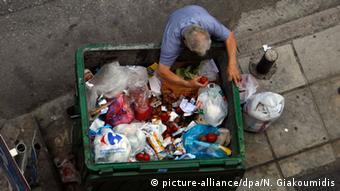IRELAND
Ireland’s crystal ball for Greek crisis
Ireland says it's possible to use austerity to a country’s advantage - and claims others should follow its lead. But should Greece really try to replicate the Celtic Comeback? Gavan Reilly reports from Dublin.
"They want us to forget their debt," rages Liam, a caller to a radio phone-in show, hours after Greece is pressured into accepting a new package of reform measures in exchange for its third bailout. "Who forgot our debt? Nobody. Let the Greeks sink or swim... We got nothing off them."
Greece's ex-Finance Minister Yanis Varoufakis has claimed countries like Ireland had been his "most energetic enemies" as he sought debt relief for his government. People like Liam might explain why.
Ireland's government, led since the 2011 election by prime minister Enda Kenny, has won gradual relief on its debt from the 2010 bailout. Repayment has been delayed several years; interest rates cut significantly; some politically difficult requirements like the sale of state assets have been delayed or abandoned entirely. Kenny's only failure has been in a half-hearted bid to achieve a debt write-off - which could have been reinvigorated by Greece's campaign for concessions of its own.
Ireland has opposed those efforts for two related reasons. The first is reputational: Ireland has been held up by more hawkish nations as a model for how harsh fiscal medicine can restart a sluggish economy. The second is electoral: Ireland's due a general election within nine months and the main rival to Kenny's coalition is Sinn Féin, which mirrors Syriza's attitudes on debt relief. Success for Greece, where Ireland had failed, would be disastrous for Kenny.
"Good pupil of austerity"
Paul Murphy, an MP for the Anti-Austerity Alliance and a supporter of debt write-down, is furious with Ireland's stance. "If Syriza was to have gotten a good deal," he argues, "it would have shown that [Ireland's] approach of being 'the good pupils of austerity' had produced a worse outcome than an approach of confrontation and struggle with the EU."
Kenny has instead used his resistance to remind voters of Ireland's relative success, and claim that Greece is now following his lead. Last month he told journalists in Brussels that, despite its austerity programme, Ireland "did not increase income tax. We did not increase VAT. We did not increase [social insurance charges] - but we put up alternatives to those measures that were proposed, in order to keep a pro-growth policy and make our country competitive."
It might appear to have worked. The Irish economy is growing faster than any other in the Eurozone, by 4.8 percent last year; unemployment has fallen by a third in three years and stands at 9.7 percent; retail sales have left stagnation and are up 7 percent in a year. Five years ago the budget deficit stood at 32.4 percent of GDP; this year it will be 2.7 percent. There is an intangible sense that the economy, while far from its peak, has at least returned to stable growth.
Beyond the figures
But headline figures do not tell the whole story. Ireland has increased its tax revenue by 28 percent in five years - increasing VAT and social insurance charges (despite Kenny's claims), and through new taxes on property and domestic water. At the same time, state spending has been lowered by 10 percent, with aggressive cuts in health spending, while welfare payments for parents and the disabled have also been trimmed.
Unemployment benefit has also been cut - particularly for those under 25, who now receive less than their elder peers. Ireland's government believes workers need 11.65 euros an hour to achieve a decent standard of living, but jobseekers under 25 receive just 100 euros a week. Many have felt little option but to emigrate, in greater numbers than at any time since the famine of 1847. A net total of 112,600 citizens have left Ireland since 2011; for every four people who have found a job in that time, five have left the country, perhaps never to return.
This is perhaps best reflected in the impact on the number of officially registered clubs of two of Ireland's most popular sports: gaelic football and hurling. As Ireland's economy peaked in 2008, emigrants had established 291 clubs outside Ireland; today there are 398. Back at home, the number has fallen from 1,908 to 1,355 during the same period, with longstanding rival clubs merging simply to ensure they have sufficient players.
Perhaps the best people to advise on Ireland's economic model are the Greeks who have seen it first-hand. "It is unfortunate that sometimes politicians do not appear to do politics from the basis of realism, but rather on the basis of vengeance," says Konstantinos Drakakis, the president of the Hellenic Community in Ireland.
Drakakis can understand why the Irish government might block Greece from achieving a deal it couldn't gain for itself. "Having lived in Ireland, and knowing this sense of fairness of the Irish people, perhaps the government only voiced this concern: 'Why did we have to suffer when in fact Greeks don't?'
"What we don't know is that Greeks suffered a lot as well, because of reforms that weren't carried out."dw de




No comments:
Post a Comment